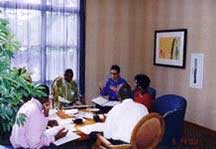Policy and Economics
UF has the capability to combine strong research and education programs in energy technology and policy. This combination of technology and policy is critical to assist the government, the energy industry, and utilities in their decision process in setting priorities for energy resource investment. The institute provides policy analyses and promotes energy policies that have a positive impact on Florida’s unique environment. UF has four centers in this area as given below.
- Public Utility Research Center (PURC),
http://www.cba.ufl.edu/purc/
PURC provides international training and strategic research in public utility regulation, market rules, and infrastructure management in the energy, telecommunications, and water industries. Its outreach activities support the expanded deployment and efficient delivery of telecommunications, energy and water/wastewater services, including the achievement of environmental objectives.
PURC energy policy research can be summarized as:- Cap and Trade Environmental Policies
- Study effects of differing industry
and government policy environments
- Deviations from least-cost outcomes
- Shifts in relative and absolute financial burdens on utilities and customers
- Shifts in relative and absolute spatial distribution of emissions sources
- Results
- Utility regulation as practiced leads to costs well in excess of least-cost outcomes as well as potentially significant cost shifting
- Study effects of differing industry
and government policy environments
- Distributed Generation (DG) and Tariff Design
- Study effects of different
tariff regimes on revenue for DG & customer
cost burden
- Recognition of value DG provides to power systems in terms of reduced losses and line loading
- Enhancement of DG revenue without subsidies
- Customers tariffs based on cost causality
- Results
- Use of more cost reflective tariffs result in greater DG revenue
- Customers located closer to generation source see network costs decline
- DG has the potential to reduce network costs for everybody
- Study effects of different
tariff regimes on revenue for DG & customer
cost burden
- Cap and Trade Environmental Policies
Initiatives are based on four principles: expertise, respect, integrity, and effectiveness. To date, 1,558 participants from more than 125 nations have participated in the PURC/World Bank International Training Program in Utility Regulation and Strategy. In addition, PURC researchers have published numerous articles on incentive regulation, utility pricing, benchmarking, investor perspectives, and market reform; these studies form the foundation of training materials.
 |  |
- Public Policy Research Center (PPRC), http://bear.cba.ufl.edu/centers/pprc/
The principal goal of the Robert F. Lanzillotti Public Policy Research Center is to foster high-quality, independent research that ultimately improves the design of sound, effective public policy in Florida and elsewhere. The insights developed through creative, objective public policy research can have immediate impacts on current policy makers, and can also help to better train future generations of business and policy leaders.
PPRC, together with other research centers on campus, helps to establish the University of Florida as a leading voice in rational discussions of public policy issues that affect the lives of all of Florida's citizens. PPRC focuses its research in energy regulation & other regulatory policy, antitrust, education, the environment, health care, international trade, and tax policy.
- Center for Governmental Responsibility (CGR), http://www.law.ufl.edu/cgr
CGR has been a mainstay for environmental and social policy research at the College of Law since 1972. CGR provides a unique opportunity to conduct research with staff attorneys on issues of state, national and international importance. Their research has led to the enactment of environmental policy relating to the Everglades and other environmentally sensitive areas, as well as to Florida's Growth Management Act. The Center has grown to cover a wide variety of major projects, policies and programs, with an annual budget in the millions of dollars. The Center’s staff now includes 11 research and teaching faculty, and four support personnel.
Research / projects include:
- Creation of Integrated Solid Waste Management Course (Poland)
- Sustainable Everglades Initiative
- Role of the Florida Cabinet in Environmental Policy
- The Future of Pollution Regulation & Enforcement: U.S. Pollution Control Issues and Responses
- Law and Policy for Water Resources Management in Florida
- Sustainable Development in Brazil
- Center for Environmental Policy, http://www.cep.ees.ufl.edu/
The Center for Environmental Policy (CEP) was established in 1991 by Dr. Howard Odum. The Center emphasizes scientific, technologic, economic, legal, political, and social dimensions of environmental policy and management. The Center's mission is to develop methods of planning, designing, and quantitatively measuring sustainable patterns of human and ecological systems. CEP conducts research, teaching, and service that addresses the interface of energy, ecology and economics. Through its communications and outreach program, the CEP provides a forum for exchange of information and increased understanding of the major environmental issues of our time.
Some examples of current research areas include:
- Net energy and environmental impacts of alternative electrical production systems, in collaboration with the University of Siena (funded by the ENEA - Italian Energy Agency).
- A three year project funded by the United Nations Environmental Program to provide technical assistance and capacity building in countries of the semi-arid lowlands of West Africa to implement appropriate policies, strategies and action plans for advancing sustainable development objectives.
- Environmental accounting of the natural capital and environmental services associated with the land holdings of the USDA- National Forest System funded by the USDA Forest Service.
- “Ecosystemic Modeling of Urban Metabolism based on Modern Thermodynamics (Emergy Method)" in collaboration with Jean Louis Scartezzini and Jean-Bernard Gay (Swiss Federal Institute of Technology in Lausanne, Switzerland) this project is funded by the Swiss National Science Foundation, under the NRP 54 Sustainable Development of the Built Environment Program.



